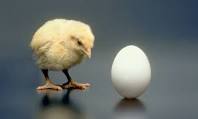
Rotavirus
Are you a germaphobe? Or in other words, do you suffer from mysophobia? Do you freak out or are tempted to spray a can of Lysol in your face if someone sneezes within 40 feet of your personal space? Clinically, you probably don’t have this phobia. However, I see a lot of people that seem to come close to it. Do you subscribe to germ theory – the idea that many diseases are caused by microorganisms (or pathogens) such as bacteria and viruses? If you do, you’re not alone. Most people see it that way. And I’m not here to disprove it or say that germ theory is all wrong. However, I believe we need a more balanced view.
Blaming illness on infection by common germs is like a drunk driver who hit a telephone pole blaming his injuries on the telephone pole. Was the telephone pole directly responsible for the damage to his car and his body? Yes, of course. Was the telephone pole the cause of his accident? Of course not! He was driving drunk! That’s why he hit the pole.
I don’t dispute the existence of bacteria, viruses, and other pathogens or their role in illness and infection. Even I have taken antibiotics when I had infections that could not be controlled by more natural means. And yes, there are some pathogens for which our immune systems cannot mount an adequate defense (such as Ebola). However, in most instances, our immune systems are capable of fighting off illness or infection due to reasonable exposure to common germs.
Pathogens, or the illnesses they are related to, are rated on two scales – morbidity and mortality. Basically, morbidity means what percentage of people who are exposed to a pathogen actually get sick from it. Mortality is the percentage of people who die from it. There are many factors that affect morbidity and mortality, outside of how mean the germ is. These include your basic level of health, stress levels, nutrition, age, etc. Often times, the very young (whose immune system hasn’t matured yet) and the very old (whose immune system is worn down) are the most susceptible.
Our susceptibility to illness varies from day to day, sometimes from moment to moment. For instance, strong negative emotions such as fear and anger seem to put our immune system on hold temporarily, leaving us vulnerable. Excessive sugar intake (as with most Americans) can cause our immune system to be depressed. Lack of sleep, too much stress, vertebral subluxations, poor eating habits (i.e. junk food – high in toxins and chemicals, low in nutrition), and other factors also reduce our immunity.
Some of these things are hard to avoid. Lifestyle changes are generally difficult to make overnight. So it is wise to reduce the exposure. That doesn’t mean to be a germaphobe, but just exercise a little caution. It’s important to note that many viruses (such as those that cause cold and flu) thrive in a warm, moist environment, such as your sinuses. You should wash your hands with soap and water a few times a day. Why? It’s not that your hands are susceptible to these viruses. It’s because we can’t seem to keep our hands away from our nose and eyes! Those are the pathways to our sinuses. What goes in the mouth (except for poisons and serious toxins) is usually not as much of an issue.
So, yes, be on your guard in a reasonable fashion. However, if you do get ill, the most effective way to figure out what happened is not to look around and see where you got the germs. You need to look in the mirror and try to figure out why your immune system failed you. It probably won’t be too hard to figure out. Most illness happens when you’re not taking very good care of yourself or you’re under a lot of stress. Take responsibility for your health and your emotions. Take care of yourself, and get natural, effective healthcare as needed.
P.S.- After I published this, I thought of some personal insights I’d like to add. What prompted this particular blog post is that I was recently sick (first time in 2-3 years). My wife is prone to bronchitis due to her asthma, which is related to a weakness left behind from having pneumonia as an infant. In spite of this, she did very well this winter until a few weeks ago. She came down with bronchitis. Then a week later, I got it. Many people would say this is typical, but in our house, it’s not the norm. While I was caring for her, I had a particularly stressful night where I slept very little. The stress plus the lack of sleep weakened my immune system. Low immunity plus high exposure equals a strong chance of getting sick.
My children are all adopted. They come from very different gene pools. But one thing they all had in common is that they rarely got sick as they were growing up. I’ve heard of families where illness goes around from child to child and often starts up again at the first child, continuing the cycle. Our family was not like that at all. My kids didn’t eat great, but their diet was above average. I taught them to enjoy fruits and vegetables and limited their consumption of junk food. But most importantly, I kept them in proper alignment with chiropractic. Whenever they would start to not feel well, I would give them an adjustment. Then they would either not get sick or it would be very mild. By working to keep their immune systems strong, there was very little illness in my home.
For more information on caring for your health and well-being, go to www.GoodHealthChiro.com or www.ohanachiropractor.com.
 I’m thankful
I’m thankful Alfred Lord Tennyson once wrote, “‘Tis better to have loved and lost than never to have loved at all.” This statement is often quoted and yet not everyone agrees with it. If you’ve ever had your heart broken, especially recently, you may think this statement is not at all true. But I believe I know what he was talking about. Even if you have lost at love, your life is richer for having experienced it.
Alfred Lord Tennyson once wrote, “‘Tis better to have loved and lost than never to have loved at all.” This statement is often quoted and yet not everyone agrees with it. If you’ve ever had your heart broken, especially recently, you may think this statement is not at all true. But I believe I know what he was talking about. Even if you have lost at love, your life is richer for having experienced it. I have had many wonderful experiences helping patients with both chiropractic and energy work for many years. I have never been one of the pseudo-medical practitioners who believe that chiropractic is just for treating joint pain and dysfunction. I believe in the original chiropractic philosophy in that it’s all about the nervous system and the proper functioning of the body for optimal health.
I have had many wonderful experiences helping patients with both chiropractic and energy work for many years. I have never been one of the pseudo-medical practitioners who believe that chiropractic is just for treating joint pain and dysfunction. I believe in the original chiropractic philosophy in that it’s all about the nervous system and the proper functioning of the body for optimal health. For a long time now, I’ve been fascinated with the idea of “trying”. The word “try”, along with all of its variations, is often misunderstood and misused. I believe that looking at this concept in the proper manner can have a major impact on your success in life. Imagine the following two scenarios –
For a long time now, I’ve been fascinated with the idea of “trying”. The word “try”, along with all of its variations, is often misunderstood and misused. I believe that looking at this concept in the proper manner can have a major impact on your success in life. Imagine the following two scenarios – What are your priorities? In other words, what are the things that are most important to you? Although they could include sports, games, and other leisure activities, most likely your responses would include spouse, children, career, education, income, and or religion. When life is going smoothly, it can be easier to maintain your priorities, although a common problem is that people tend to get lazy and start slipping away from the things that are really important toward the things that are more fun or easier. When things aren’t going so smoothly, when times are turbulent and stresses mount, there are two common responses. For some people, it brings their priorities into sharp focus. Especially when we feel threatened, we cling to the things that are the very most important to us. For other people, they can sometimes go into panic or survival mode and completely lose sight of the priorities.
What are your priorities? In other words, what are the things that are most important to you? Although they could include sports, games, and other leisure activities, most likely your responses would include spouse, children, career, education, income, and or religion. When life is going smoothly, it can be easier to maintain your priorities, although a common problem is that people tend to get lazy and start slipping away from the things that are really important toward the things that are more fun or easier. When things aren’t going so smoothly, when times are turbulent and stresses mount, there are two common responses. For some people, it brings their priorities into sharp focus. Especially when we feel threatened, we cling to the things that are the very most important to us. For other people, they can sometimes go into panic or survival mode and completely lose sight of the priorities. I’ve written before about how the purpose of life is to have joy and that happiness can be gained in a variety of ways, especially with expressing gratitude. Since we’re all looking for happiness, it’s normal to associate happiness with particular people, places, events, foods, etc. This can sometimes be helpful. When we start to lose our way on the path to joy, they can be an anchor – something we can return to that reminds us of happier times, thus enabling us to re-experience that feeling of happiness. Sometimes however, these associations can be destructive. Perhaps the most common of these are sweet foods. People frequently get into a cycle where they eat to feel happy (comfort foods), but then they gain weight. When they see the weight gain, it causes a degree of sadness and disappointment. So where do they go for comfort? Sweet, fatty foods. Then they get into that downward spiral. I knew another guy who was a clean freak. He would spend so much time cleaning that he would often fall short on other important responsibilities. That would make him feel guilty. How did he deal with the feelings of guilt? Clean some more.
I’ve written before about how the purpose of life is to have joy and that happiness can be gained in a variety of ways, especially with expressing gratitude. Since we’re all looking for happiness, it’s normal to associate happiness with particular people, places, events, foods, etc. This can sometimes be helpful. When we start to lose our way on the path to joy, they can be an anchor – something we can return to that reminds us of happier times, thus enabling us to re-experience that feeling of happiness. Sometimes however, these associations can be destructive. Perhaps the most common of these are sweet foods. People frequently get into a cycle where they eat to feel happy (comfort foods), but then they gain weight. When they see the weight gain, it causes a degree of sadness and disappointment. So where do they go for comfort? Sweet, fatty foods. Then they get into that downward spiral. I knew another guy who was a clean freak. He would spend so much time cleaning that he would often fall short on other important responsibilities. That would make him feel guilty. How did he deal with the feelings of guilt? Clean some more. Chicken vs. egg – which comes first? Compared to many of life’s pressing questions, that one seems easy. As I’ve studied cause and effect over the years, and as I’ve learned about principles of happiness, success, the law of attraction, etc., I’ve had to change many of my former paradigms. For instance, I’ve always thought that if I could be “successful”, I would then be happier. Now, I’m finding that success is often the result of happiness, not the cause of it. Another one – if I could solve my most pressing problems, I would be at peace. That’s logical, isn’t it? And yet, it appears that the best condition for finding answers to your problems is to be at peace. When you can take a deep breath, have faith, believing an answer will come, and accept the situation for what it is, you allow that peace to come into your mind, which allows inspiration to flow and answers to come. It doesn’t always come right away or like a brick upside the head. It often comes, softly and subtly. That’s how inspiration works.
Chicken vs. egg – which comes first? Compared to many of life’s pressing questions, that one seems easy. As I’ve studied cause and effect over the years, and as I’ve learned about principles of happiness, success, the law of attraction, etc., I’ve had to change many of my former paradigms. For instance, I’ve always thought that if I could be “successful”, I would then be happier. Now, I’m finding that success is often the result of happiness, not the cause of it. Another one – if I could solve my most pressing problems, I would be at peace. That’s logical, isn’t it? And yet, it appears that the best condition for finding answers to your problems is to be at peace. When you can take a deep breath, have faith, believing an answer will come, and accept the situation for what it is, you allow that peace to come into your mind, which allows inspiration to flow and answers to come. It doesn’t always come right away or like a brick upside the head. It often comes, softly and subtly. That’s how inspiration works.